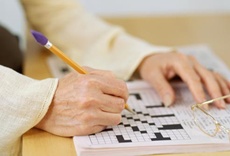Crossword solvers have brains 10 years younger than their age!
18 Jul 2017
If you are one of those that needs their daily crossword fix, don't be put off by dimwits telling you it's a waste of time – scientists have shown that your brain may be 10 years younger than your actual age.
 Researchers calculate that people who engage in daily word puzzles have brain function equivalent to 10 years younger than their age, on tests of grammatical reasoning speed and short-term memory accuracy.
Researchers calculate that people who engage in daily word puzzles have brain function equivalent to 10 years younger than their age, on tests of grammatical reasoning speed and short-term memory accuracy.
Scientists at the University of Exeter and King's College London carried online testing on more than 17,000 healthy people aged 50 to gauge their memory, attention and reasoning. They found that the more regularly participants engaged with word puzzles, the better they performed on tasks assessing attention, reasoning and memory.
The researchers say that it was proved that daily crossword solving could help prevent mental decline in later life.
Enlightened newspaper editors have long encouraged their sub-editors to engage in crossword solving. Now, there is a scientific basis for this. Professor Keith Wesnes, from the University of Exeter, said, "We found direct relationships between the frequency of word puzzle use and the speed and accuracy of performance on nine cognitive tasks assessing a range of aspects of function including attention, reasoning and memory.
"Performance was consistently better in those who reported engaging in puzzles, and generally improved incrementally with the frequency of puzzle use.
"For example, on test measures of grammatical reasoning speed and short-term memory accuracy, performing word puzzles was associated with an age-related reduction of around 10 years.
"We now need to follow up this very exciting association in a clinical trial, to establish whether engaging in puzzles results in improvement in brain function."
The scientists are hoping their work will identify the lifestyle factors that will help people maintain healthy brains.
Professor Clive Ballard, also from the University of Exeter, said, "We can't yet say that crosswords give you a sharper brain, the next step is to assess whether encouraging people to start playing word games regularly could actually improve their brain function."
The results were presented at the Alzheimer's Association International Conference (AAIC) 2017 in London.
Dementia charities said that it was possible that puzzles help build up cognitive reserve which protected the brain against decline in later life.
Dr Doug Brown, from the Alzheimer's Society, told The Telegraph, "We know that keeping an active mind can help to reduce decline in thinking skills. This new research does reveal a link between word puzzles, like crosswords, and memory and thinking skills, but we can't say definitively that regular 'puzzling' improves these skills.
"To be able to say for sure, the crucial next step is to test if there are benefits in people who take up word puzzles. In the meantime, our top tips to reduce the risk of developing dementia are keeping physically active, avoiding smoking and eating a healthy balanced diet."


















